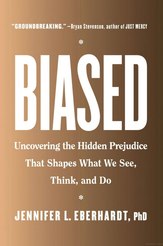A WRITER'S WIT |
My Book World

An excellent book for every American to read. Why? Dr. Eberhardt addresses the concept of implicit bias, and she begins with some great examples that lead to a clear definition:
“Whether bad or good, whether justified or unjustified, our beliefs and attitudes can become so strongly associated with the category that they are automatically triggered, affecting our behavior and decision making. So, for example, simply seeing a black person can automatically bring to mind a host of associations that we have picked up from our society: this person is a good athlete, this person doesn’t do well in school, this person is poor, this person dances well, this person lives in a black neighborhood, this person should be feared. The process of making these connections is called bias. It can happen unintentionally. It can happen unconsciously. It can happen effortlessly. And it can happen in a matter of milliseconds. These associations can take hold of us no matter our values, no matter our conscious beliefs, no matter what kind of person we wish to be in the world” (31-2)
And study she has. Eberhardt teaches at Stanford University and is a well-respected scientist in her field. In this finely written book, she combines research (hard statistics) with personal examples (her own plus observations of others). She begins the book speaking about the Oakland, California police department whose leadership is attempting to address bias. She addresses a small auditorium of polite, white officers, most of whom have their arms crossed, body language for Show me. It may be the most difficult lecture she ever gives. In wrapping up her book she speaks once again of the Oakland police, after ten years of training, and she views things from their perspective, demonstrating, I believe, her global understanding of the problem and of human nature. Again, a must-read for all of us.



 RSS Feed
RSS Feed